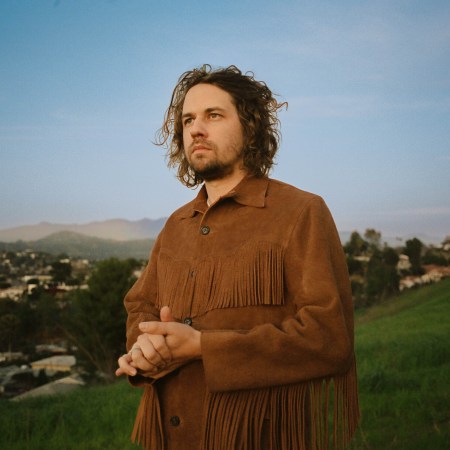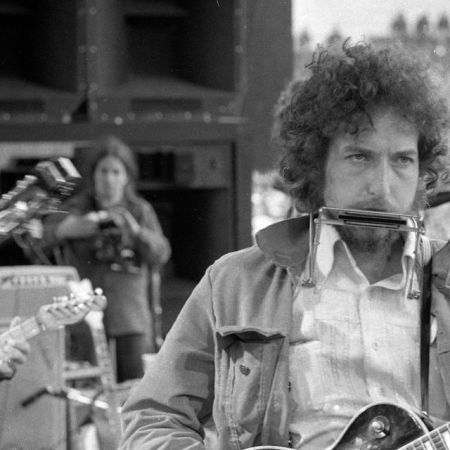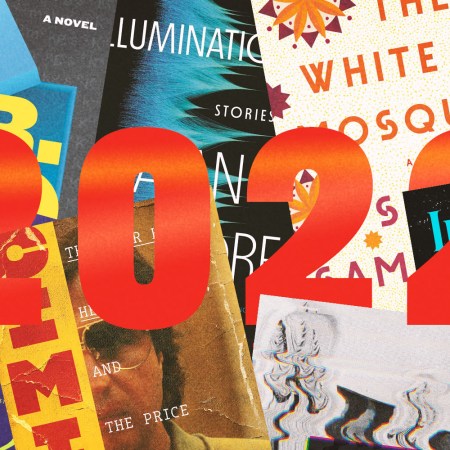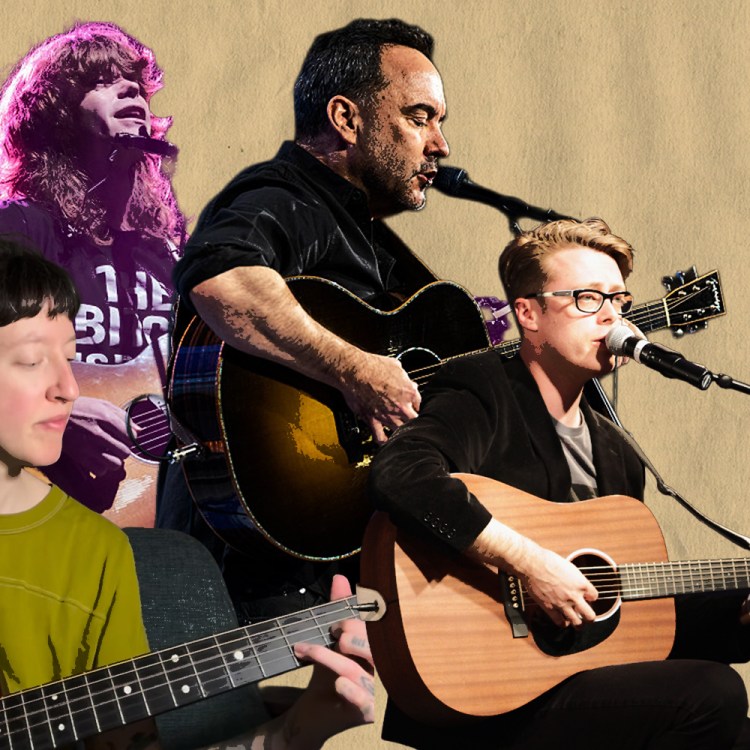The Mountain Goats aren’t an obvious choice to be hitmakers. When singer/songwriter John Darnielle began releasing music under the name The Mountain Goats back in the ‘90s, he regularly released ultra lo-fi home recordings of songs captured on an old boombox, the rawness of them only adding to the emotional honesty of the songs, as well as the idea that they were hidden gems to be uncovered. But in 2021, the group’s 2002 song “No Children” became an unexpected viral hit on TikTok, its darkly witty narrative of a couple falling apart now far and away their most popular song, with 56 million streams on Spotify. Not bad for a once-lo-fi bedroom folk troubadour.
Over the past three decades, Darnielle built up a cult audience and expanded the group to a band — featuring Peter Hughes, Jon Wurster and Matt Douglas — and the Mountain Goats have grown into a celebrated indie institution, their intricately written, darkly humorous and unusually empathetic and compassionate character studies capturing heroes in quieter moments, hard-luck losers in a graceful and charitable light, and sometimes simply personal reflections made universal. Every protagonist in a Mountain Goats song is complicated, but they all populate a rich world that’s self-referential and full of colorful personalities.
With the Mountain Goats’ 24th album Jenny From Thebes arriving just before Halloween, we put together a list of 25 of the band’s greatest songs, from tributes to goths and wrestlers to fictional accounts of sympathetic antiheroes.
25. “Clean Slate,”Jenny From Thebes (2023)
Rare is the Mountain Goats album that doesn’t get off the ground with a spectacular leadoff track, and the band’s latest, Jenny from Thebes, is no exception. A song in conversation with a couple of other songs in the band’s catalog — ”Jenny” and “Color in Your Cheeks” from 2002’s All Hail West Texas — it reintroduces Jenny, the protagonist of the album. Backed by a rich arrangement of strings and horns, it sets the stage in cinematic fashion, the titular Jenny already envisioning her exit strategy from a life she wants to leave behind: “No one lasts for long in this profession, so they say/Maybe see you again someday.”
24. “Passaic 1975,”In League With Dragons (2019)
John Darnielle wrote one of the standout entries in the 33 ⅓ book series, on Black Sabbath’s Master of Reality, penned from the perspective of a young adult in a psychiatric institution in 1985, seeking solace through the comfort of heavy metal. On In League With Dragons, an album concerned with the somewhat related fields of wizards and fantasy, Darnielle revisits Sabbath through a quieter, affectionate but nonetheless unglamorous portrait of Ozzy Osbourne “in a Holiday Inn by a nameless river/Renew the assault on my lungs and my liver.” In a sense it’s a look at Darnielle’s personal favorite wizard, sapping himself of his own magic.
23. “Dark In Here,”Dark In Here (2021)
The Mountain Goats released Dark in Here as the third of a series of releases to drop mid-pandemic, a haunting musical companion for an inescapable sense of isolation. And though its narratives aren’t as gripping as those based on Darnielle’s own youth, his recurring fictional characters or the artists-as-characters that often show up in Mountain Goats songs, it’s a beautifully understated set of songs. “Dark In Here” is its greatest peak, an eerie, Morricone-esque set of cinematic surf-twang imbued with fear and paranoia: “Will you be ready when your moment comes? Will your hands be steady when you reach down for your guns?”
22. “Onions,”The Coroner’s Gambit (2000)
Much of The Mountain Goats’ early material was performed by John Darnielle solo, just his voice and guitar played through a lo-fi and low-tech cassette player. “Onions” is no different in that regard, but it finds the idea of a Mountain Goats song beginning to expand thanks to the addition of extra instrumentation, namely a one-note violin drone and some gentle touches of bluesy guitar. Mountain Goats songs got much bigger from there over time, but compared to the stark sounds of their first few albums, it feels fuller and richer, and with a gleam of optimism in Darnielle’s lyrics of an impending spring: “Springtime’s coming — that means you’ll be coming back around.”
21. “As Many Candles As Possible,”Getting Into Knives (2020)
The greatest instrument in The Mountain Goats’ arsenal is John Darnielle’s own narrative prowess. Yet they are in fact a band, and as a band, they’re more than capable of delivering a truly barn-burning performance when everything clicks into place, as it does on “As Many Candles As Possible,” from 2020’s Getting Into Knives. A dark and hard-driving recent peak, it’s given an extra layer of dazzle due to some subtle touches of vibraphone and some organ from legendary keyboardist Charles Hodges, best known for his work with Al Green.
20. “Wage Wars Get Rich Die Handsome,”Bleed Out (2022)
The Mountain Goats essentially have two types of albums: actual concept albums, and albums whose songs are more loosely thematically tied. Very seldomly have Darnielle and company ever released a record that feels like just a bunch of disconnected songs, but even so, it’s frequently the more explicitly conceptual records that yield some of the best material. Last year’s Bleed Out, produced by Bully’s Alicia Bognanno, is one such album, each of its songs nodding to action and crime films from the ‘70s and ‘80s. Its best moment is “Wage Wars Get Rich Die Handsome,” a barnburning rocker that lives in the thrill of getting away with it and speeding away without a trace. “In a world of heavy footprints, be untraceable,” Darnielle sings, in what’s by far one of the least subtle songs in the group’s oeuvre.
John Darnielle Loves Talking About Records Almost as Much as He Loves Making Them
The Mountain Goats singer holds forth on Bonnie Raitt, Depeche Mode and … the Mountain Goats19. “It Froze Me,”Nothing For Juice (1996)
It’s easy to imagine a song like “It Froze Me” being an unstoppable hit song if it were given the benefit of a big-budget studio production. That’s not what it is, however, and it’s all the more special as a result. One of Darnielle’s catchiest solo performances while maintaining the intimacy of a stark, distorted demo-quality recording, “It Froze Me” leaves its gorgeously simple immediacy to exist in charmingly understated form — an impeccable pop song that feels almost as if it was never meant to leave the bedroom.
18. “Snow Crush Killing Song,” Sweden (1995)
The beauty of a song like “Snow Crush Killing Song” is in its simplicity. One of the highlights from 1995’s Sweden, recorded during Darnielle’s stretch of primarily self-recorded music, the song comprises only his voice and guitar, tape hiss and low-fidelity distortion. Darnielle doesn’t offer many details as to what happens between the narrator and the object of the song, just that as the snow piles up outside, what’s happening inside grows more tense and desperate: “When I ask you to look at me/You look away.”
17. “Amy aka Spent Gladiator 1,”Transcendental Youth (2012)
The Amy in “Ama aka Spent Gladiator 1,” the leadoff track to 2012’s Transcendental Youth, refers to Amy Winehouse, who died shortly before Darnielle wrote the song. But as he explained in an interview with Time, the song is for “all the other Amy Winehouses in the world who aren’t famous,” a short, upbeat and empathetic tribute to the troubled souls and outcasts who need to hear it most. The words of wisdom here are mostly universal: “Do every stupid thing that makes you feel alive,” “let people call you crazy for the choices that you make.” But Darnielle saves the most important and most gutting one for the chorus: “Just stay alive.”
16. “Cubs in Five,”Nine Black Poppies (1995)
Written more than two decades before the Cubs ended their marathon drought by winning the World Series in 2016, “Cubs in Five” is a celebration of the underdog. One of the rawest, fuzziest early highlights from the nine-song Nine Black Poppies EP, “Cubs in Five” celebrates all the in-a–perfect-world possibilities of wonderful things that will never happen: intelligent life on the moon, Canterbury Tales topping best-seller lists, Bill Gates spearheading a Heaven 17 revival. The kicker is Darnielle punctuating this list with “and I will love you again.” Whether or not this is an optimistic song or a deeply cynical one is perhaps a matter of perspective, but it’s the kind of love song that only Darnielle himself could write.
15. “Going to Georgia,”Zopilote Machine (1994)
John Darnielle had begun to distance himself recently from “Going to Georgia,” a fan-favorite and a live staple from debut album Zopilote Machine, a great album that nonetheless showed only glimmers of promise in terms of the level of songwriting to come from the prolific artist. A song both fucked-up and romantic, it follows a protagonist on the road as he intends to meet his love with a loaded Colt .45 “with a busted safety catch.” The way Darnielle’s voice rises during the chorus as he sings “The world shines/As I cross the Macon County line” is powerful, even inspiring, despite what ultimately is a tale told from a deeply damaged narrator. Last year, Darnielle commented that in hindsight, the song “takes it rather too easy on its narrator,” which is probably true. But a powerful song is nonetheless a powerful song, and even if it doesn’t fit with where the Goats are now, it still occasionally makes it back into their live performances.
14. “Estate Sale Sign,”All Eternals Deck (2011)
Nearly a decade after exploring a disintegrating marriage over the course of a full album in Tallahassee, Darnielle tapped into a similar blend of sadness and anger that colored his narratives about the fabled Alpha Couple with “Estate Sale Sign,” a postmortem of a relationship as told through memories being sold on picnic tables. “Crude little wooden idols and aviator shades/The trinkets and treasures we brought back from the crusades,” he sings, his voice frayed and sneering, intensifying with bile as it speeds toward an intense climax.
13. “Color in Your Cheeks,”All Hail West Texas (2000)
The source material for the main character on the new Mountain Goats album Jenny From Thebes goes back to 2002, when the titular Jenny appeared on several songs on the last of Darnielle’s lo-fi albums (until 2020’s Songs for Pierre Chuvin). She’s just one of several people who file in and out of the same house after a long trip, seeking sanctuary. They’re weary and worn out, “broken pretty bad” or “dead on their feet,” but they’re met with a kind of punk rock hospitality, and an unnamed offering that promises the cure within the song’s title. We know more about where these people have been than where they’re going or even who they are, but Darnielle treats them with a kind of warmth and dignity all the same.
12. “Weekend in Western Illinois,”Full Force Galesburg (1997)
A hi-fi standout among the lo-fi songs on 1997’s Full Force Galesburg, “Weekend in Western Illinois” has apparently only been performed live 20 times throughout the Mountain Goats’ career (according to Setlist.fm), which is somewhat surprising, given how much of a belter it is. A starry-eyed fantasy of romantic escape “that wouldn’t work out like it seems in that half-minute of what-if,” as Darnielle once explained in an interview, it comes alive in that brief moment of possibility. Its soaring chorus — “And we love these dogs that roll on the lawns here in Galesburg/Because they seem to know something nobody else knows” — seems custom-made for massive group sing-alongs, so it’s encouraging to see that the group has, in fact, played it live this year for the first time in seven years.
11. “Oceanographer’s Choice,”Tallahassee (2002)
The Mountain Goats’ 2002 album Tallahassee is one of their most celebrated albums, a full-length document of a fictional “Alpha Couple,” whose relationship goes south in spectacular, explosive fashion. “Oceanographer’s Choice,” the album’s penultimate song, is likewise one of its most raucous, with distorted guitars and organ, and tension that could hold up medieval weaponry. On that note, the song opens with one of Darnielle’s wildest first lines: “Well, guy in a skeleton costume comes up to the guy in a Superman suit, runs through him with a broadsword.” And from there the desperation of the narrator and his crumbling marriage boils over agonizingly and brilliantly.
10. “Lovecraft in Brooklyn,” Heretic Pride (2008)
Taking inspiration from H.P. Lovecraft’s The Horror at Red Hook, a work of fiction informed heavily by the horror writer’s own racist beliefs, “Lovecraft in Brooklyn” finds its protagonist with similar feelings of xenophobia and paranoia. Driven, fittingly, by a raucous electric power-chord riff, the song finds Darnielle imbuing his own performance with the kind of intensity his deranged protagonist calls for as he grows fearful and starts packing a switchblade: “Someday something’s coming/from way out beyond the stars/To kill us while we stand here/It’ll store our brains in mason jars.” To accompany the release of Heretic Pride, Jeffrey Lewis created illustrations for each of the album’s songs; this one featured a depiction of Chthulu-like tentacles attacking the Brooklyn Bridge.
9. “Rain in Soho,”Goths (2017)
The Mountain Goats’ 2017 album Goths is a concept album about — you guessed it — goths. More specifically, a group of goths struggling to cope with a culture in transition, delivered with a degree of authority and affection, what with Darnielle himself having undergone his own goth stage earlier on in his life. “Rain in Soho” is a haunting and operatic postmortem of a cultural moment (“The river goes where the water flows/No one knows when the Batcave closed”), ornate and ominous, with the Nashville Symphony Chorus providing suitably gothic vocals as a backdrop, evoking Sisters of Mercy in their late ‘80s prime.
8. “Dance Music,”The Sunset Tree (2005)
More than once in the Mountain Goats catalog, music has provided sanctuary for broken people. In the case of “Dance Music,” it’s Darnielle himself, looking back on his childhood and growing up in a house with an abusive stepfather. Dire as the scenario is that he lays out, Darnielle does so via an upbeat major key melody — musically as fun as The Mountain Goats get. But when the scene turns violent, he runs upstairs to avoid the outburst and turns up the stereo: “So this is what the volume knob’s for.” It doesn’t have a happy resolution — in fact, as Darnielle transitions into his teenage years in the second verse, he alludes to a friend’s possible overdose, but amid the darkness, dance music remains that place of salvation and deliverance.
7. “The Legend of Chavo Guerrero,”Beat the Champ (2005)
Goths and Beat the Champ are both albums born of a fandom, one of, well, goth and the other professional wrestling, both told through character sketches of mostly real people. Beat the Champ, much like most Goats records, is a complex tangle of emotions, fraught with hubris and tragedy, but “The Legend of Chavo Guerrero” is one of the most bittersweet, affectionately paying tribute to a hero while alluding to Darnielle’s abusive stepfather: “He was my hero back when I was a kid/You let me down, but Chavo never once did.” That Guerrero, a veteran grappler who became the oldest WWE Cruiserweight Champion in history, had a good relationship with his own son only makes it all the more heartbreaking.
6. “Your Belgian Things,”We Shall All Be Healed (2004)
We Shall All Be Healed is one of two albums released in succession that draw most heavily from John Darnielle’s background, its songs populated by drug-addicted friends from his youth. The gentle, heart-rending “Your Belgian Things” observes the aftermath of a friend’s death, possibly by overdose or perhaps something even more grotesque, with “guys in biohazard suits, mud caking on their rubber boots.” It’s deeply sad from every angle, a life cut short and picked apart by a toxic cleanup crew because of an unbreakable habit: “A tiger’s never gonna change its stripes I guess/I guess/But Jesus what a mess.” But Darnielle offers the gift of dignity and grace in a situation where there’s very little of either to be found.
5. “Matthew 25:21,” The Life of the World to Come (2009)
John Darnielle’s songs about wrestlers and rock stars are empathetic and warm, and often a little sad; the songs that draw from his own life are often utterly devastating. “Matthew 25:21” is a quiet meditation on loss, written about visiting his mother-in-law as she was dying of cancer. It’s gentle and understated, the weight of his grief-stricken words hanging heavy without the need for histrionics. It’s heartbreaking and real, a universal feeling that all of us will someday go through, and which never really gets any easier. But Darnielle addresses the passing of a loved one with grace, kindness and affection.
4. “Woke Up New,” Get Lonely (2006)
A great many of John Darnielle’s most poignant songs are written about loss or grieving, and “Woke Up New” is no exception, though it’s a meditation on a different kind of grieving, that of a relationship rather than of a person. Yet the feeling isn’t that different, the protagonist of this understated highlight from 2006’s Get Lonely trying to make sense of his life without someone waking up next to him. In soft, gentle tones, Darnielle sings of making too much coffee, talking to himself and turning up the thermostat because the house is too cold, feeling the absence not just emotionally but physically. Closing with the repeated refrain of “What do I do?,” he sounds not just desperate but lost, incapable of understanding what his life is if it’s to be lived alone.
3. “This Year,”The Sunset Tree (2005)
The climactic standout from The Sunset Tree, the most overtly autobiographical album in John Darnielle’s body of work, spikes an album heavily informed by trauma with a dose of optimism. “This Year” captures the band at their catchiest, returning to a chorus of “I am gonna make it through this year if it kills me” as both a hook and a mantra of survival and endurance. The song follows a teenage Darnielle as he drives around southern California, playing video games and getting drunk, and returning home with a roar of the engine as if to challenge his stepfather: “I downshifted as I pulled into the driveway, the motor screaming out stuck in second gear/It ends badly as you might imagine.” But the optimism remains, its infectious chorus a source of strength and a mantra of determination for anyone who needs it.
2. “No Children,”Tallahassee (2002)
I don’t know that “No Children” would have been my first guess for which Mountain Goats song would have gone viral, if in large part because it’s a 20-year-old song. But that being said, it’s far and away one of the group’s greatest moments, a sprightly, strummy folk ditty of marital unhappiness delivered with gallows humor and a penetratingly bleak point of view. “I hope I cut myself shaving tomorrow, I hope it bleeds all day long,” Darnielle sings. “Our friends say it’s darkest before the sun rises, we’re pretty sure they’re all wrong.” Where the Alpha Couple goes, disaster follows, and the almost cartoonish level of bile and animosity between them goes a long way toward explaining why this song caught on with a new generation of TikTok users. It’s wildly entertaining, impeccably written, and while most of the time Darnielle seems to prefer to examine his protagonists with a sympathetic eye, he allows these two to fail spectacularly.
1. “The Best Ever Death Metal Band in Denton,”All Hail West Texas (2000)
The best ever death metal band in Denton is just two guys, Cyrus and Jeff, a couple of heshers who can’t settle on a name: Satan’s Fingers, the Killers or the Hospital Bombers. They’re also archetypal Mountain Goats protagonists: embattled, possibly fuck-ups, but they’re kids who believe deeply in the salvation of music — like Darnielle himself, like Mountain Goats fans. Inspired both by kids he worked with at a psychiatric hospital as well as a friend of a friend in the ‘80s who was taken away from his life by Mormon elders, “Denton” initially feels campy, light and fun, but the tone changes dramatically when Jeff is sent by his parents to a reform school (or possibly a mental hospital) “where they told him he’d never be famous.” It then turns ominous, with plans to enact revenge. But in its final minute, Darnielle delivers one of the most resonant lines of any Mountain Goats song — ”When you punish a person for dreaming his dream, don’t expect him to thank or forgive you” — followed by a hearty cry of “Hail Satan!”
This article appeared in an InsideHook newsletter. Sign up for free to get more on travel, wellness, style, drinking, and culture.


























